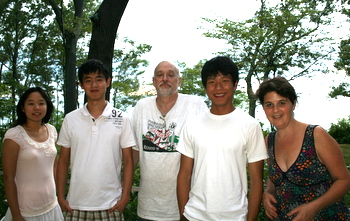Feinberg Student Group Focuses on Environmental Responsibility
 |
|
Physicians for Society Responsibility members (L-R) Connie Choi, Lizhou Huang, Peter Orris, MD, MPH, adjunct assistant professor of preventive medicine, and Alexander Sheu, joined Sarah Lovinger, MD, executive director of Physicians for Social Responsibility’s Chicago Chapter, to discuss the effects of global warming on human health. |
Students from the Northwestern University Feinberg School of Medicine chapter of Physicians for Social Responsibility (PSR), a national non-profit advocacy organization, serve as ambassadors for the environment. The group meets bi-monthly to discuss topics like global warming, alternative energy sources and responsible food purchasing, and to organize events for fellow students.
“Physicians for Social Responsibility strives to promote more sustainable behavior and thinking,” says Alexander Sheu, a second year medical student and member of PSR.
The ties between medicine and social responsibility may not be obvious, but they do exist, Sheu says. For instance, global warming and airborne pollutants have an adverse affect on preventable diseases such as asthma. Also, health professionals create waste, sometimes while helping patients; providers may end up hurting their patients by contaminating the environment, negating their initial motives. Peers and faculty mentors should consider these issues, Sheu says, because physicians are often seen as role models in society, and as such should make socially responsible choices to set a positive example for others.
In an effort to train students to implement green habits as practicing physicians later in life, PSR supports several programs and events throughout the year. At one event, Sarah Lovinger, MD, executive director of Physicians for Social Responsibility’s Chicago Chapter spoke to Feinberg medical students about the devastating effects of global warming on human health.
Sheu says presentations like this are essential offerings on the Chicago campus.
“It is important to make students aware of problems that they will see in the clinic that result from environmental issues,” he says.
On the Chicago campus, PSR has also initiated several projects, most notably their recycling programs. Recycling bins are placed throughout medical school buildings to dispose of paper, aluminum, and glass, and the entrance of the Galter Health Sciences Library serves as a convenient drop-off point for used batteries, cell phones, and printer cartridges.
“If these items were simply placed in a landfill, it is possible that the heavy metals could find their way into our water supply,” says Sheu, adding that the group delivers bags filled with recycled materials to a local recycling service. “Instead, we try to promote reasonable daily actions that people can take to minimize their personal damage to the earth. We only have one shot with this planet and we want to make our chance a success.”






